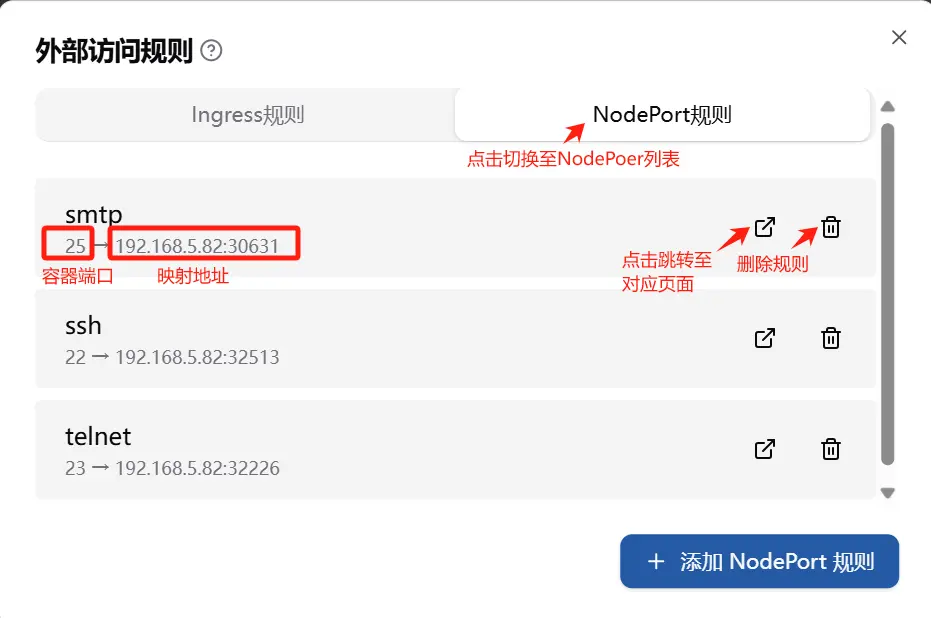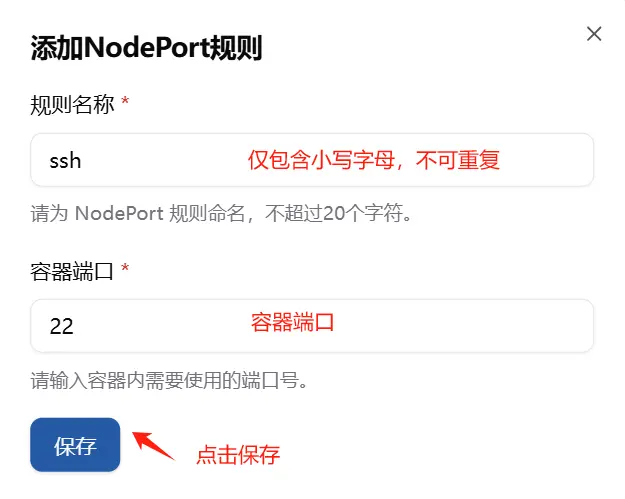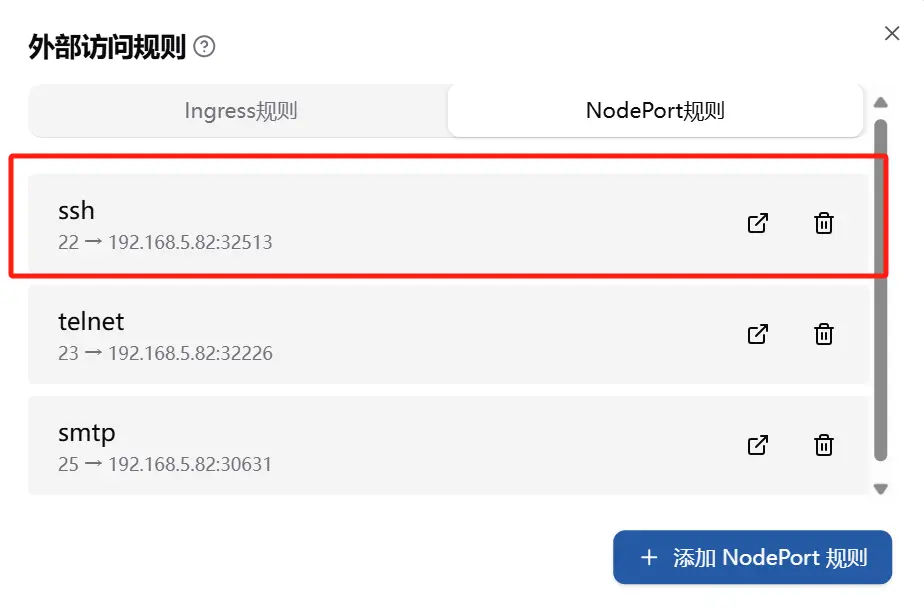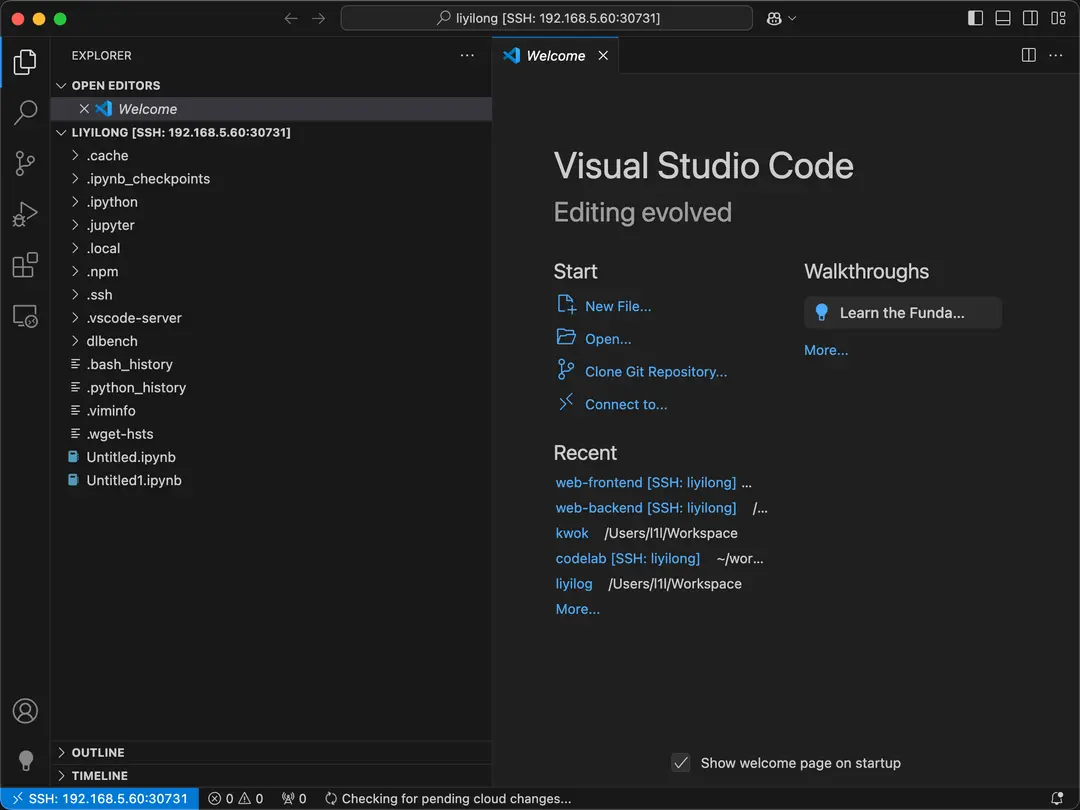NodePort Access Rules
NodePort rules can expose service ports and allow external users to access them via the IP address of a cluster node and a specified port number.
2.1 Feature Introduction
NodePort rules allow you to directly access services in a Kubernetes cluster through an external IP address. Unlike Ingress rules, NodePort rules expose service ports and allow external users to access them through the IP address of a cluster node and a specified port number. NodePort rules are suitable for applications that require external access, such as SSH connections.
In NodePort rules, Kubernetes automatically assigns a port number from the range 30000 to 32767 for the service. For example, if you want to connect to a node in the cluster via SSH, Kubernetes will assign a port for the service, and you can connect from the outside using that port number.
Advantages:
- Suitable for applications requiring direct external access, such as SSH connections.
- Automatically assigns a port for the service, simplifying configuration.
- Does not depend on HTTP/HTTPS protocols.
Use Cases:
- Connecting to nodes in the cluster via SSH (port 22).
- Other applications that require access through specific ports.
Forwarding Path: Accessible via {nodeIP}:{nodePort}. Here, nodeIP is the address of any node in the cluster, and nodePort is the assigned port number.

After configuration, the following content will be visible in the corresponding Pod's Annotations, using nodeport.crater.raids.io as the key:
metadata:
annotations:
crater.raids.io/task-name: tensorboard-example
nodeport.crater.raids.io/smtp: '{"name":"smtp","containerPort":25,"address":"192.168.5.82","nodePort":30631}'
nodeport.crater.raids.io/ssh: '{"name":"ssh","containerPort":22,"address":"192.168.5.82","nodePort":32513}'
nodeport.crater.raids.io/telnet: '{"name":"telnet","containerPort":23,"address":"192.168.5.82","nodePort":32226}'2.2 Usage Example
When you want to access certain applications (such as SSH connections) via an external IP address, you can use NodePort rules. For example, you can configure a NodePort rule to expose the SSH port (port 22) to enable remote development via tools such as VSCode.
Steps to set up a NodePort external access rule:
-
Click "Set External Access Rule" on the job details page.

-
Click "Add NodePort Rule" in the popped-up dialog, enter the corresponding rule name (only lowercase letters, no more than 20 characters, and must be unique), as well as the container port, and click Save.

-
After successfully saving, you will see the corresponding NodePort rule.

Example Configuration:
{
"name": "ssh",
"containerPort": 22,
"address": "192.168.5.82",
"nodePort": 32513
}Field Description:
- Container port number (
containerPort): Select port 22, usually used for SSH services. - Cluster node address (
address): The IP address of any node in the cluster. - Assigned NodePort port (
nodePort): Kubernetes automatically assigns a port number for the service from the range 30000 to 32767.
Access Method:
- Kubernetes automatically assigns a port number for the SSH service, and you can use this port to establish an SSH connection via an external IP (e.g., for remote development using VSCode).
- For example, Kubernetes assigns a port for this service (such as
32513), and you can connect usingssh user@<node-ip>:32513.
The effect of connecting to a remote Jupyter Notebook via NodePort in VSCode is as follows:

Ingress Access Rules
Using Ingress rules, you can specify that external visitors can access services through specific paths.
Quickly Connect Using SSH Function
To help users connect to containers more conveniently, this platform provides the SSH function. After configuring password-less SSH login, users can copy the connection command with one click and connect to the container via Terminal or VSCode.